unit4 grammar 虚拟语气 use
人教版 初中英语九年级教案 之 unit4 + 虚拟语气
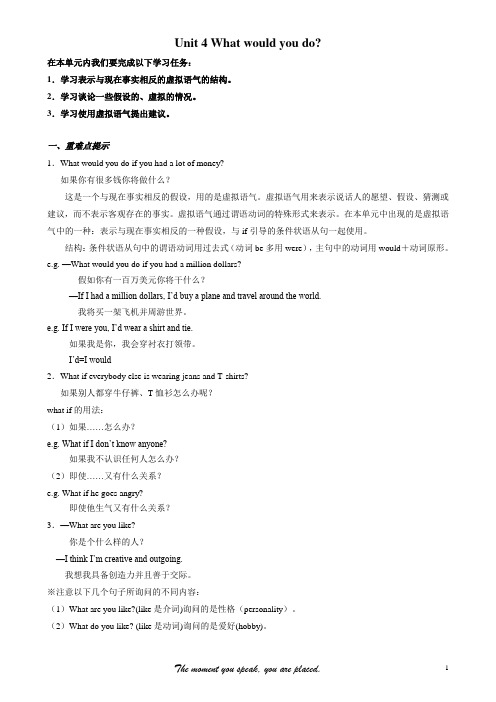
Unit 4 What would you do?在本单元内我们要完成以下学习任务:1.学习表示与现在事实相反的虚拟语气的结构。
2.学习谈论一些假设的、虚拟的情况。
3.学习使用虚拟语气提出建议。
一、重难点提示1.What would you do if you had a lot of money?如果你有很多钱你将做什么?这是一个与现在事实相反的假设,用的是虚拟语气。
虚拟语气用来表示说话人的愿望、假设、猜测或建议,而不表示客观存在的事实。
虚拟语气通过谓语动词的特殊形式来表示。
在本单元中出现的是虚拟语气中的一种:表示与现在事实相反的一种假设,与if引导的条件状语从句一起使用。
结构:条件状语从句中的谓语动词用过去式(动词be多用were),主句中的动词用would+动词原形。
e.g. —What would you do if you had a million dollars?假如你有一百万美元你将干什么?—If I had a million dollars, I’d buy a plane and travel around the world.我将买一架飞机并周游世界。
e.g. If I were you, I’d wear a shirt and tie.如果我是你,我会穿衬衣打领带。
I’d=I would2.What if everybody else is wearing jeans and T-shirts?如果别人都穿牛仔裤、T恤衫怎么办呢?what if的用法:(1)如果……怎么办?e.g. What if I don’t know anyone?如果我不认识任何人怎么办?(2)即使……又有什么关系?e.g. What if he goes angry?即使他生气又有什么关系?3.—What are you like?你是个什么样的人?—I think I’m creative and outgoing.我想我具备创造力并且善于交际。
人教版初中英语九年级教案之unit4虚拟语气
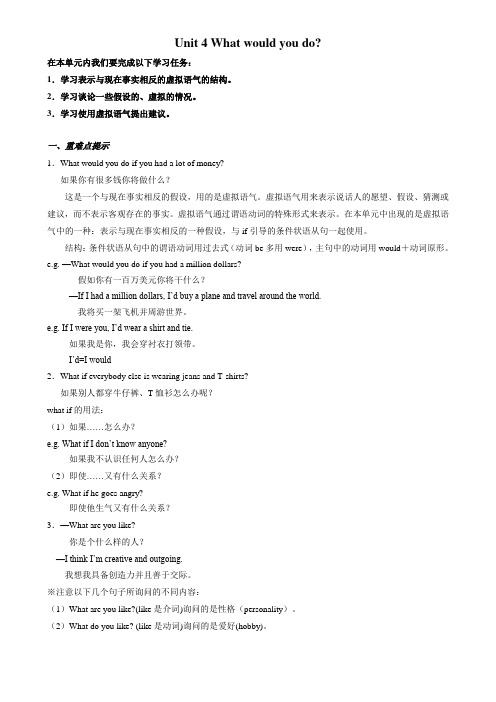
Unit 4 What would you do?在本单元内我们要完成以下学习任务:1.学习表示与现在事实相反的虚拟语气的结构。
2.学习谈论一些假设的、虚拟的情况。
3.学习使用虚拟语气提出建议。
一、重难点提示1.What would you do if you had a lot of money?如果你有很多钱你将做什么?这是一个与现在事实相反的假设,用的是虚拟语气。
虚拟语气用来表示说话人的愿望、假设、猜测或建议,而不表示客观存在的事实。
虚拟语气通过谓语动词的特殊形式来表示。
在本单元中出现的是虚拟语气中的一种:表示与现在事实相反的一种假设,与if引导的条件状语从句一起使用。
结构:条件状语从句中的谓语动词用过去式(动词be多用were),主句中的动词用would+动词原形。
e.g. —What would you do if you had a million dollars?假如你有一百万美元你将干什么?—If I had a million dollars, I’d buy a plane and travel around the world.我将买一架飞机并周游世界。
e.g. If I were you, I’d wear a shirt and tie.如果我是你,我会穿衬衣打领带。
I’d=I would2.What if everybody else is wearing jeans and T-shirts?如果别人都穿牛仔裤、T恤衫怎么办呢?what if的用法:(1)如果……怎么办?e.g. What if I don’t know anyone?如果我不认识任何人怎么办?(2)即使……又有什么关系?e.g. What if he goes angry?即使他生气又有什么关系?3.—What are you like?你是个什么样的人?—I think I’m creative and outgoing.我想我具备创造力并且善于交际。
高一英语人教版必修四 Unit4 Grammar
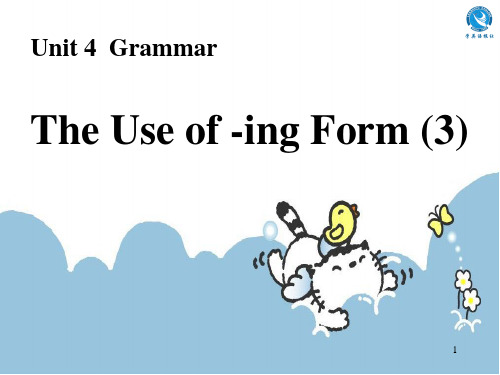
2. ________the piano, someone suddenly knocked at the door. A. Playing B. When I was playing C. Repairing D. Examining
13
3. Mother caught the boy ______ in the corner. A. smoke B. to smoke C. being smoked D. smoking
= Four people enter the room and looked
around in a curious way.
(2)Being poor, he couldn’t afford a TV set. 原因
5
(3)Working hard, you’ll surely succeed. 条件
11
单选
1. The stranger said something in a _______ voice and the little girl was very much _______. A. frightening, frightened B. frightened, frightening C. frightening, frightening D. frightened, frightened
Unit 4 Grammar
The Use of -ing Form (3)
1
动词-ing 形式在句中作定语和状语是 本单元的学习重点。
1. 作定语 动词-ing 形式可以单独充当名词的前置 修饰语, 这时有两种情况。
(1)动词-ing形式表示 “供作......之用”的 意 思, 这类作定语的-ing形式过去叫动名词。 a swimming pool
苏教牛津译林高中英语模块6_Unit4 _语法专讲:虚拟语气
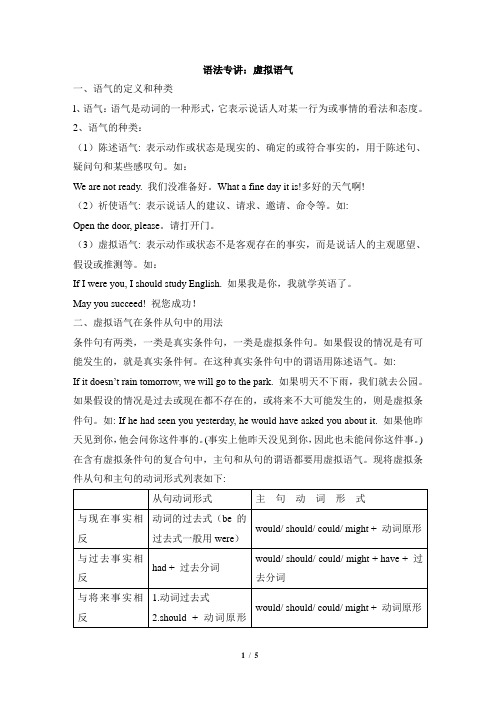
语法专讲:虚拟语气一、语气的定义和种类l、语气:语气是动词的一种形式,它表示说话人对某一行为或事情的看法和态度。
2、语气的种类:(1)陈述语气: 表示动作或状态是现实的、确定的或符合事实的,用于陈述句、疑问句和某些感叹句。
如:We are not ready. 我们没准备好。
What a fine day it is!多好的天气啊!(2)祈使语气: 表示说话人的建议、请求、邀请、命令等。
如:Open the door, please。
请打开门。
(3)虚拟语气: 表示动作或状态不是客观存在的事实,而是说话人的主观愿望、假设或推测等。
如:If I were you, I should study English. 如果我是你,我就学英语了。
May you succeed! 祝您成功!二、虚拟语气在条件从句中的用法条件句有两类,一类是真实条件句,一类是虚拟条件句。
如果假设的情况是有可能发生的,就是真实条件何。
在这种真实条件句中的谓语用陈述语气。
如:If it doesn’t rain tomorrow, we will go to the park. 如果明天不下雨,我们就去公园。
如果假设的情况是过去或现在都不存在的,或将来不大可能发生的,则是虚拟条件句。
如: If he had seen you yesterday, he would have asked you about it. 如果他昨天见到你,他会问你这件事的。
(事实上他昨天没见到你,因此也未能问你这件事。
) 在含有虚拟条件句的复合句中,主句和从句的谓语都要用虚拟语气。
现将虚拟条件从句和主句的动词形式列表如下:注: 主句中的should只用于I、we,但在美国英语中,should常被would代替;从句中的should 可用于各种人称。
l、表示与现在事实相反的假设和结果。
如:If my brother were here, everything would be all right.要是我哥哥在这儿,一切都没问题了。
〖2021年整理〗《选修6 Unit4 Grammar and usage参考》优秀教案
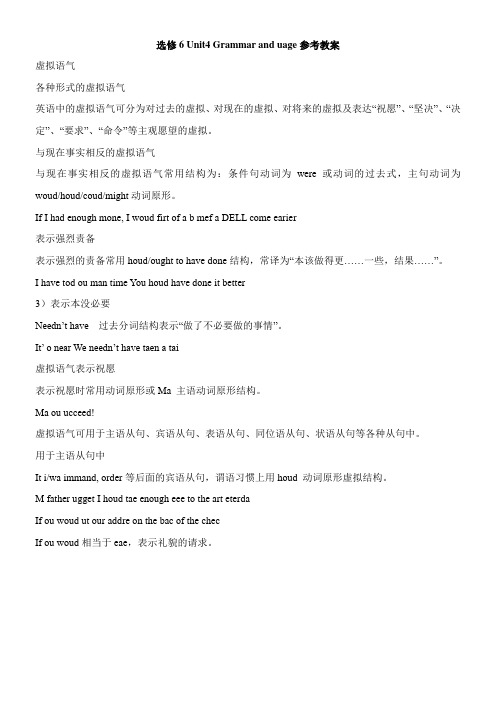
选修6 Unit4 Grammar and uage参考教案虚拟语气各种形式的虚拟语气英语中的虚拟语气可分为对过去的虚拟、对现在的虚拟、对将来的虚拟及表达“祝愿”、“坚决”、“决定”、“要求”、“命令”等主观愿望的虚拟。
与现在事实相反的虚拟语气与现在事实相反的虚拟语气常用结构为:条件句动词为were或动词的过去式,主句动词为woud/houd/coud/might动词原形。
If I had enough mone, I woud firt of a b mef a DELL come earier表示强烈责备表示强烈的责备常用houd/ought to have done结构,常译为“本该做得更……一些,结果……”。
I have tod ou man time You houd have done it better3)表示本没必要Needn’t have 过去分词结构表示“做了不必要做的事情”。
It’ o near We needn’t have taen a tai虚拟语气表示祝愿表示祝愿时常用动词原形或Ma 主语动词原形结构。
Ma ou ucceed!虚拟语气可用于主语从句、宾语从句、表语从句、同位语从句、状语从句等各种从句中。
用于主语从句中It i/wa immand, order等后面的宾语从句,谓语习惯上用houd 动词原形虚拟结构。
M father ugget I houd tae enough eee to the art eterdaIf ou woud ut our addre on the bac of the checIf ou woud相当于eae,表示礼貌的请求。
同步译林英语选修六新突破讲义:Unit 4 Section Ⅲ Grammar——虚拟语气(Ⅱ) Word版含答案
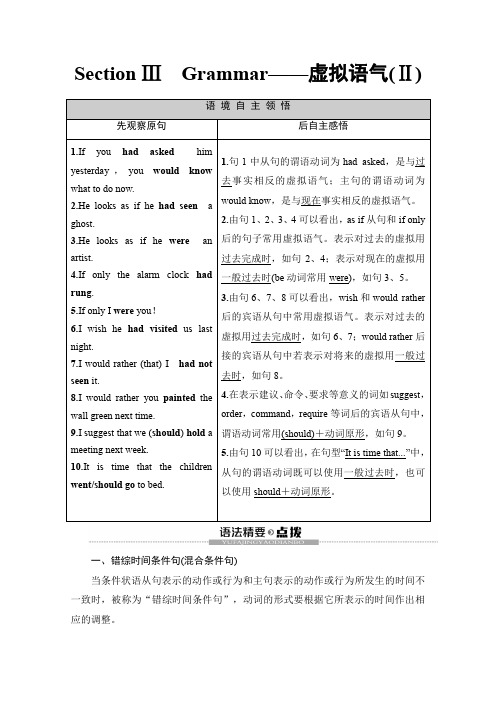
Section ⅢGrammar——虚拟语气(Ⅱ)一、错综时间条件句(混合条件句)当条件状语从句表示的动作或行为和主句表示的动作或行为所发生的时间不一致时,被称为“错综时间条件句”,动词的形式要根据它所表示的时间作出相应的调整。
If you had followed my advice just now,you would be better now.如果你刚才听了我的建议,你现在就好多了。
If he were free today,we would have sent him to Beijing.如果他今天有空的话,我们就派他去北京了。
[即时训练1]用所给词的适当形式填空①If you had studied (study)hard before,you would be (be)a college student now.②If you hadn't lost the map,we would be (be)back in the hotel now.二、含蓄虚拟条件句有时虚拟的条件不通过条件从句表达出来,而是暗含在单词、短语或上下文中,这时需要根据句中所表述的意义以及某些特定的信息词来判断此时需要采用的形式。
常用词或短语有:with,without,but for,or else,or,otherwise等。
But for her help,they couldn't have run over the mountain in such a short time.要不是她的帮助,他们不会在那么短的时间内翻过那座山。
I was ill that day.Otherwise,I would have taken part in the sports meeting.我那天病了。
否则,我就参加运动会了。
He must have been there,or he never could know the place so well.他一定去过那儿,否则他决不会如此了解那个地方。
高中英语Unit4SectionⅢGrammar__虚拟语气Ⅱ教案含解析牛津译林版选修6
Section ⅢGrammar——虚拟语气(Ⅱ)一、错综时间条件句(混合条件句)当条件状语从句表示的动作或行为和主句表示的动作或行为所发生的时间不一致时,被称为“错综时间条件句”,动词的形式要根据它所表示的时间作出相应的调整。
If you had followed my advice just now,you would be better now.如果你刚才听了我的建议,你现在就好多了。
If he were free today,we would have sent him to Beijing.如果他今天有空的话,我们就派他去北京了。
[即时训练1] 用所给词的适当形式填空①If you had studied (study)hard before,you would be (be)a college student now.②If you hadn't lost the map,we would be (be)back in the hotel now.二、含蓄虚拟条件句有时虚拟的条件不通过条件从句表达出来,而是暗含在单词、短语或上下文中,这时需要根据句中所表述的意义以及某些特定的信息词来判断此时需要采用的形式。
常用词或短语有:with,without,but for,or else,or,otherwise等。
But for her help,they couldn't have run over the mountain in such a short time.要不是她的帮助,他们不会在那么短的时间内翻过那座山。
I was ill that day.Otherwise,I would have taken part in the sports meeting.我那天病了。
否则,我就参加运动会了。
He must have been there,or he never could know the place so well.他一定去过那儿,否则他决不会如此了解那个地方。
2019-2020英语选修六讲义:Unit 4 Section Ⅲ Grammar——虚拟语气(Ⅱ) 含答案
Section Ⅲ Grammar——虚拟语气(Ⅱ)一、错综时间条件句(混合条件句)当条件状语从句表示的动作或行为和主句表示的动作或行为所发生的时间不一致时,被称为“错综时间条件句”,动词的形式要根据它所表示的时间作出相应的调整。
If you had followed my advice just now,you would be better now.如果你刚才听了我的建议,你现在就好多了。
If he were free today,we would have sent him to Beijing.如果他今天有空的话,我们就派他去北京了。
[即时训练1] 用所给词的适当形式填空①If you had studied (study)hard before,you would be (be)a college student now.②If you hadn't lost the map,we would be (be)back in the hotel now.二、含蓄虚拟条件句有时虚拟的条件不通过条件从句表达出来,而是暗含在单词、短语或上下文中,这时需要根据句中所表述的意义以及某些特定的信息词来判断此时需要采用的形式。
常用词或短语有:with,without,but for,or else,or,otherwise等。
But for her help,they couldn't have run over the mountain in such a short time.要不是她的帮助,他们不会在那么短的时间内翻过那座山。
I was ill that day.Otherwise,I would have taken part in the sports meeting.我那天病了。
否则,我就参加运动会了。
He must have been there,or he never could know the place so well.他一定去过那儿,否则他决不会如此了解那个地方。
九年级第四单元英语知识点
九年级第四单元英语知识点本文将为大家介绍九年级第四单元的英语知识点,包括语法、词汇、听力和阅读等方面,帮助同学们更好地掌握相关内容。
一、语法知识点1. 直接引语和间接引语直接引语是直接转述他人的话语,用引号括起来;间接引语是将别人的话转述成自己的话。
例如:直接引语:She said, "I like playing basketball."间接引语:She said that she liked playing basketball.2. 虚拟语气虚拟语气用来表示非真实的情况或假设的情况,包括虚拟条件句和虚拟语气的用法。
例如:虚拟条件句:If I were you, I would go.虚拟语气的用法:It's time you went to bed.3. 定语从句定语从句用来修饰前面的名词或代词,起修饰作用。
例如:The boy who is reading a book is my brother.二、词汇知识点1. 同义词与反义词同义词是指意思相同或相近的词语,可以丰富文章表达;反义词是指意思相反的词语,可以对比强调差异。
例如:同义词:start - begin; happy - joyful反义词:hot - cold; big - small2. 词组与短语词组是由多个词语组成,一起使用形成固定表达的组合;短语是由多个单词组成,整体含义比单个词或词组更具体。
例如:词组:take care of; look forward to短语:pull oneself together; break the ice三、听力技巧1. 注意听力材料中的关键词关键词可以帮助我们更好地理解材料的重点和要点,提高听力效果。
例如:听到对话中的"tomorrow",可以判断谈论的时间范围是明天。
2. 练习听力的常见方式多听英语材料,如英语歌曲、英语电影、英语广播等,逐渐提高对英语语音和语调的理解能力。
高中英语必修四unite4知识点
高中英语必修四unite4知识点高中英语必修四Unit 4主要讲述了语法和词汇两个方面,是英语学习的重点内容。
以下将分别进行介绍。
一、语法知识点1.虚拟语气虚拟语气在英语中是比较重要的一个语法知识点,尤其在口语和写作中经常使用。
它表示的是虚假的或非真实的情况,根据它在句子中的位置不同,可以分为主语从句、宾语从句和条件句。
主语从句:主语从句中,虚拟语气的形式是“should/were + 动词原形”,表示的是我们想象的或未实现的条件,如“如果我有一百万美元,我就会去环游世界。
”宾语从句:宾语从句中的虚拟语气也是“should/were + 动词原形”,但是要注意的是在有些情况下(如宾语从句为动词不定式时)没有虚拟语气。
条件句:条件句中的虚拟语气分为三种情况:第一类条件句表示与现实相反的假设,其形式为“if+过去式+would/could/should+动词原形”,如“If I had enough money, I would buy a house.”;第二类条件句表示与现实相反的假设,其形式为“if+过去完成式+would/could/should+动词原形”,如“If I had met him last week, I could have helped him.”;第三类条件句表示可能发生的情况,其形式为“if+现在式+will/can/should+动词原形”,如“If I have time tomorrow, I will help you.”2.被动语态被动语态在英语中也是一项基本的语法知识点,其句子的主语是被动的,动作的执行者则成为状语,主语可以是各种词类,而被动语态的形成则是将动词的过去分词加上助动词“be”。
被动语态的应用:在写作中被动语态可以强调动作的执行者或结果,可以包含更多的信息,比如说,科技论文中常常应用被动语态来描述实验的程序和结果。
二、词汇知识点1.词根、前缀和后缀词根、前缀和后缀对于学习英语单词是非常有帮助的,在语音、语法和意义的理解方面都有很大的作用。
- 1、下载文档前请自行甄别文档内容的完整性,平台不提供额外的编辑、内容补充、找答案等附加服务。
- 2、"仅部分预览"的文档,不可在线预览部分如存在完整性等问题,可反馈申请退款(可完整预览的文档不适用该条件!)。
- 3、如文档侵犯您的权益,请联系客服反馈,我们会尽快为您处理(人工客服工作时间:9:00-18:30)。
3.In adverbial clauses introduced by even if, as if, as though and if only we can use unreal conditionals.
他那样对待我,好像我是陌生人似的。 He treated me as if I were a stranger.
It’s high time that you went. 你该走了。 It’s high time that you should go. 我们该去 It’s time that we went to bed.
睡觉了。
It’s time that we should go to bed.
4.表示要求,命令,建议的虚拟语气。 1.宾语从句。常见动词: 一个坚持,两个命 令,三个建议,四个要求。即 1.insist 2. order, command
我希望和你一样高。
I wish I were as tall as you.
他希望他没讲那样的话。
He wished he hadn‘t said that.
我希望明天下雨就好了。
I wish it would rain tomorrow.
现在: did
2. would rather that
过去: had done 未来: did
ቤተ መጻሕፍቲ ባይዱ
I suggest that we (should) hold a meeting next week. He insisted that he (should ) be sent there. 注意: 如suggest, insist不表示"建议" 或"坚 持要某人做某事时",即它们用于其本意" 暗示、表明"、"坚持认为"时,宾语从句用 陈述语气。
Part A Answers A (1) had not studied (2) would not be (4) would have (3) had studied (6) would be (5) knew (8) would not be (7) could help
e otherwise, or and phrases beginning with with, without and but for to replace an ifclause in implied conditionals
2.假设条件虚拟倒装。 条件从句中有should, were, had三个助动词可以把if省略,并将 这三个词提至句首。 If I were you, I would give it up. Were I you, I would give it up.
If I had had time, I would have run round that lake again. Had I had time, I would have run round that lake again. If there should be a flood, what should we do? Should there be a flood, what should we do?
Without air (If there were no air) , there would be no living things. But for your help (If it hadn’t been for your help) , I couldn’t have done it. I was busy that day. Otherwise I would have gone there with them. (If I hadn’t been busy that day, I would have gone there with them.) I would have finished the work, but I have been ill. (If I hadn’t been ill, I would have finished the work.)
他们要求我们派他们去那儿工作(sendto)。 We suggested that Tom have a rest. He insisted that I (should )be present.
The king ordered that the prisoners be killed the next day. They requested that we (should) send them to work there.
1.We use mixed conditionals when the main clause and the if-clause are about different tenses. Eg. If you had come and attended the meeting yesterday, you would know what we are doing now. If you had followed my advice, you would not be in trouble now.
虚拟语气
1) 概念 虚拟语气用来表示说话人的主观愿望或假 想,所说的是一个条件,不一定是事实,或 与事实相反。 2) 在条件句中的应用 条件句可分为两类,一类为真实条件句, 一类为非真实条件句。非真实条件句表示的 是假设的或实际可能性不大的情况,故采用 虚拟语气。
在条件状语从句中,表示与事实相反的条件和结果。 1) 与现在事实相反: If 主语 …, 主语 should (would +V原 were 2)与过去事实相反: could, might) V-ed If 主语 ,主语 +have Ved should (would had Ved 3)与将来事实相反: could, might) If 主语 …, 主语 +V原
注意: 在虚拟语气的从句中,动词'be'的过去时态一律用 "were",不用was, 即在从句中be用were代替。 If I were you, I would go to look for him. 如果我是你,就会去找他。 If he were here, everything would be all right. 如果他在这儿,一切都会好的。
should were to did should (would could, might)
虚拟语气假设条件句型注意点: 1.假设条件从句谓语动词发生的时间与主句 所假设的谓语动词不一致,叫做错综条件 虚拟语气。主句和从句的谓语动词要依照 假设的时间而定。 If the weather had been finer, the crops would be growing still better. If you had followed the teacher’s advice, you wouldn’t be in the hospital.
1. Had you listened to the doctor, you _________ all right now. A. are B. were C. would be D. would have been 2. __________ any change about the date, please tell me immediately. A. Will there be B. Should there be C. There will be D. There should be 3. __________ today, he would get there by Friday. A. Would he leave B. Was he leaving C. Were he to leave D. If he leave
4. Should it rain, the crops _____ . A. would be saved B. would have been saved C. will be saved D. had been saved 5. You _____ come earlier. The bus left a moment ago. A.would B. should have C. may D. have 6. What should we do if it _____ tomorrow? A. should snow B. would snow C. snow D. will snow
I would rather you paid me now. I would rather you had gone, too. Don’t come. I would rather you came tomorrow.
3.It’s (about/high) time +that
did should do
典型例题 _____ to do the work, I should do it some other day. A. If were IB. I were C. Were I D. Was I
在虚拟条件状语中如果有were, should, had这三个词主语提前, 变成 were, should, had +主语的形式。但要注意,在虚拟条件状语从句 中,省略连词的倒装形式的句首不能用动词的缩略形式。如我们可 说 Were I not to do., 而不能说 Weren't I to do.
1.He insisted that she______(be)seriously ill and that was _________(send) to hospitals at once. be sent 2.He suggested that we________(have) a meeting at once. have 3.His pale face suggested that he______(be) ill. was
